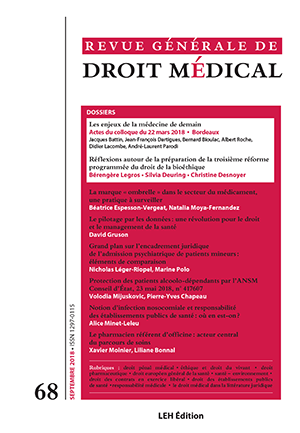0
Panier
0 €

Notion d’infection nosocomiale et responsabilité des établissements publics de santé : où en est-on ?
Citer cet ouvrage :
Minet-Leleu Alice, Notion d’infection nosocomiale et responsabilité des établissements publics de santé : où en est-on ? ,RGDM, n°68, 2018, p.215-230
Exporter vers RIS
Télécharge un fichier pour utilisation dans EasyBib, Mendeley, Zotero, etc.
EXPORTER vers RIS
Télécharge un fichier pour utilisation dans EasyBib, Mendeley, Zotero, etc.
EXPORTER vers RIS


